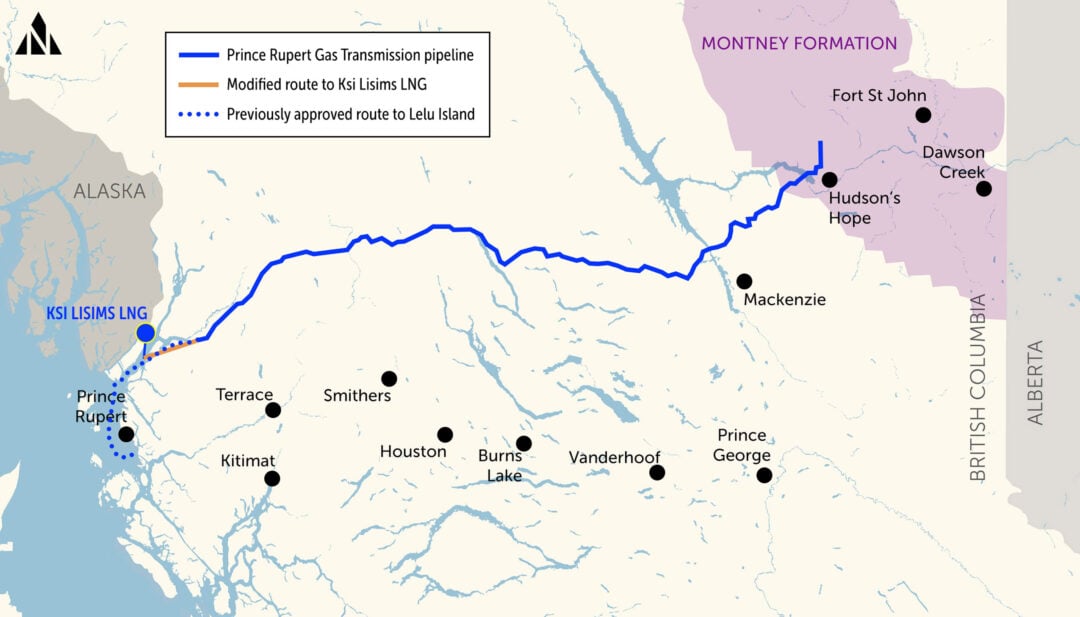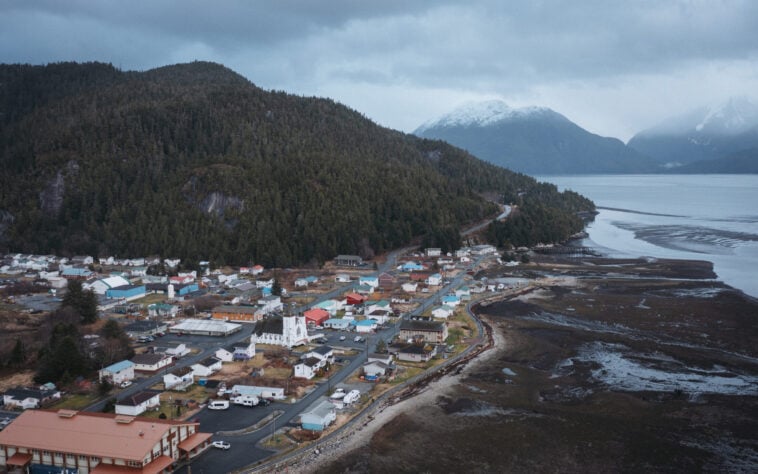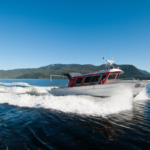By Matt Simmons, Local Journalism Initiative Reporter, The Narwhal
By early September, B.C. politicians will decide the fate of the province’s next big LNG venture.
According to an announcement quietly posted on a provincial government website last week, the Ksi Lisims LNG environmental assessment was completed on Aug. 7 and referred to B.C.’s ministers of environment and energy for a final decision. The ministers — Tamara Davidson and Adrian Dix, respectively — were given 30 days to decide whether or not to approve the major fossil fuel development.
Ksi Lisims LNG is a proposed floating liquefied natural gas (LNG) export facility, which would be built on the B.C.-Alaska border about 100 kilometres north of Prince Rupert. Backed by the Nisg̱a’a government and Texas-based Western LNG, it would be supplied by the contested Prince Rupert Gas Transmission pipeline, an 800-kilometre project that will cross more than 1,000 waterways and dozens of First Nations’ territories.
B.C.’s natural gas export industry kicked off this summer when LNG Canada started operations in Kitimat. That facility, supplied by the controversial Coastal GasLink pipeline, is the first major liquefaction and export project built in Canada. If built, Ksi Lisims LNG would be capable of producing 12 million tonnes of LNG annually, nearly as much as LNG Canada will produce initially.
The announcement noted the federal government will also review the assessment and “a package of materials to support the federal decision” that have been sent to the impact agency, which reviews major projects for compliance with Canada’s Impact Assessment Act.
On the same day it referred the Ksi Lisims LNG project for a decision, the environmental assessment office declined requests from Metlakatla and Lax Kw’alaams First Nations for dispute resolution processes. Both nations had previously entered into dispute resolution with the province but neither were able to reach agreement. (Another First Nation, Gitga’at, had also entered into the process but withdrew before completing.)

In near-identical letters sent to each nation on Aug. 7, Julie Chace, a senior official with the environmental assessment office, noted the office would not facilitate additional dispute resolution.
“I do not consider it necessary or reasonable for the [Environmental Assessment Office] and Metlakatla to participate in another facilitated [dispute resolution] process,” she wrote in one of the two letters. “Dispute resolution is a tool to help resolve substantial disagreements as a next step to reach consensus if parties are unable to reach consensus on their own.”
“There is no prospect of achieving consensus in a further facilitated dispute resolution over matters that have already been addressed.”
Davis Thames, President and CEO of Western LNG
Chace added she took under consideration a request from Ksi Lisims LNG that the office refer the project for decision “without further delay.”
That request, which was submitted in a letter dated July 29, was written by the Texas company’s president and CEO, Davis Thames. In it, he urged the office to reject the requests and wrote “there is no prospect of achieving consensus in a further facilitated dispute resolution over matters that have already been addressed.” Thames added the nations “will have an opportunity to raise their outstanding concerns in a meeting with the ministers during the 30-day decision-making phase.”
Chace’s letters echoed the wording used by the industry executive.
“Metlakatla’s outstanding concerns and lack of consent regarding the project and sustainability recommendation may be presented directly to the ministers at this meeting, following referral and prior to their decision,” she wrote.
Neither Metlakatla nor Lax Kw’alaams were able to provide comment prior to publication. The B.C. government did not comment prior to publication.




